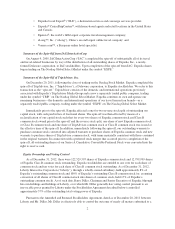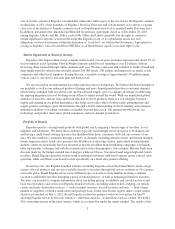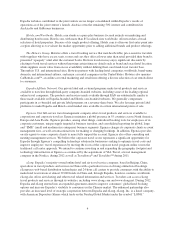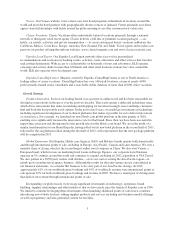Expedia 2012 Annual Report Download - page 18
Download and view the complete annual report
Please find page 18 of the 2012 Expedia annual report below. You can navigate through the pages in the report by either clicking on the pages listed below, or by using the keyword search tool below to find specific information within the annual report.Travel metasearch engines and content aggregators: Travel metasearch websites, including Kayak.com
(which entered into a merger agreement with Priceline.com in November 2012) and Trivago.com (in which
Expedia has agreed to acquire a majority ownership interest), and travel research sites that have search
functionality, such as TripAdvisor, aggregate travel search results for a specific itinerary across supplier, travel
agent and other websites. If these competitors limit our participation within their results, it could affect our
traffic-generating arrangements in a negative manner. In addition, some metasearch sites, such as Kayak.com,
offer users the ability to make hotel reservations directly on their websites.
Social media websites and mobile platform travel applications: In recent years, social media websites,
including Facebook.com, mobile platforms, including smartphones and tablet computers, have emerged and are
growing significantly. The emergence of mobile platforms has lead increasing use by consumers of standalone
applications to research and book travel. In addition, Facebook has recently launched enhanced search
functionality for data included within its website, which may in the future develop into an alternative research
resource for travelers.
We cannot assure you that we will be able to compete successfully against any current, emerging and future
competitors or on platforms that may emerge, or provide differentiated products and services to our traveler base.
Increasing competition from current and emerging competitors, the introduction of new technologies and the
continued expansion of existing technologies, such as metasearch and other search engine technologies, may
force us to make changes to our business models, which could affect our financial performance and liquidity.
Increased competition has resulted in and may continue to result in reduced margins, as well as loss of travelers,
transactions and brand recognition.
Declines or disruptions in the travel industry could adversely affect our business and financial
performance.
Our business and financial performance are affected by the health of the worldwide travel industry. Travel
expenditures are sensitive to personal and business-related discretionary spending levels and tend to decline or
grow more slowly during economic downturns. Decreased travel expenditures could reduce the demand for our
services, thereby causing a reduction in revenue.
Beginning in 2008, domestic and global economic conditions deteriorated rapidly resulting in increased
unemployment and a reduction in available budgets for both business and leisure travelers, which slowed spending
on the services we provide and had a negative impact on our revenue growth. Further economic weakness and
uncertainty may result in significantly decreased spending on our services by both business and leisure travelers,
which may have a material adverse impact on our business and financial performance. More recently, during 2012,
several Eurozone countries experienced deteriorating credit and economic conditions, which resulted in significant
devaluation of the Euro relative to other currencies, such as the U.S. dollar, and it is possible that certain Eurozone
countries could leave the Euro currency in the future, which could adversely impact our Euro-denominated net
assets, gross bookings, revenues, operating expenses, and net income as expressed in U.S. dollars.
Our business is also sensitive to fluctuations in hotel supply, occupancy and average daily rates (“ADRs”),
decreases in airline capacity periodically rising airline ticket prices, or the imposition of taxes or surcharges by
regulatory authorities, all of which we have recently experienced. For example, the significant decline in ADRs,
which began in late 2008 and continued through 2009, negatively impacted our hotel booking revenue. In
addition, ADRs on our websites in both 2008 and 2009 declined faster than in the overall travel industry due to a
number of factors including the increased use of our distribution channels for promotional activities by hotels.
To the extent ADRs decline in the future, our hotel booking revenue may be negatively impacted.
Other factors that could negatively affect our business include:
• Air fare increases;
• Continued air carrier consolidation;
12
























